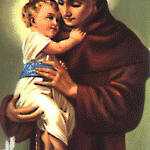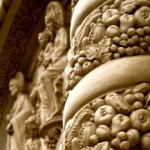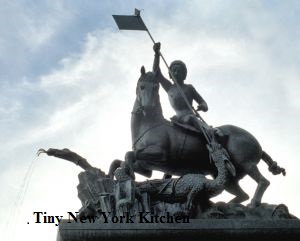June 13th
Few are the saints more beloved and invoked than Saint Anthony of Padua. A Franciscan of the 12th century, many of his achievements have been forgotten because of his reputation as a saint who has the special ability to help find things which have been lost. Despite the humility that made him sweep each day the floor of the monastery and slow to speak for himself, he was an eloquent and stern preacher against error, so much so that he was known as the “hammer of heretics.” He could speak many languages, and evidently all his sermons were not of the fiery kind, for it is said that even the fishes listened to him with delight.
In statues we see him holding the Infant Jesus because of a vision he had of the Child. His devotion had much to do with making him the helpful, kindly saint he is to the world today. Lighted taper candles are always to be found burning before his statue and altar in churches.
He is reputed able to find anything, from money and papers and jewelry to lost children. From lost gloves to lost love. “Dear Saint Anthony, please come round…something is lost and must be found.”
April 23rd is the Feast of Saint George. For all of his popularity little is known about Saint George except that he was born in Cappadocia (Turkey), that he was a soldier and suffered martyrdom. The crusaders brought his fame to the West. He is the patron saint of England, Aragon, Portugal and certain parts of Germany. Before the Conquest many English churches had been named after Saint George and the story of his brave deeds were revered everywhere.
Saint George’s best known deed is legendary. Legend has it that he slayed a horrible dragon in order to save a maiden who had been vowed to a monster. The story goes that Saint George transfixed the dragon with a spear and then told the maiden to lead the monster around so that he could put an end to him. St. George was very well known by that time as a man of God and a confessor of His works. Apparently, after witnessing the miraculous slaying of the dragon, 20,000 people were converted to Christ. The king begged St. George stay in exchange for half of the kingdom. St. George refused the offer because he wanted to ride on and carry God’s message.
Saint George is especially honored in England as its great patron. Flags are flown on this feast day, but in earlier times this feast day was filled with more elaborate celebrations (processions, jousts & races). The dishes served on this day should be English favorites such as roast beef and Yorkshire pudding.
In Allier, a winegrowing region of France, there is an interesting observance of Saint George’s Day. If frost has not harmed the vines by this day then a clean, soft little towel is offered to the statue of the saint and his feet are washed in wine. There will be shouts of “Vive Monsieur Saint Georges.” If frost has harmed the vines, however, Saint George is not very popular and though his feet are still washed a rough, coarse cloth is used.
Saint Swithin is one of the “weather saints” particularly rain. There is a saying that goes:
Saint Swithin’s Day, if thou dost rain,
For forty days it will remain;
Saint Swithin’s Day, if thou be fair,
For forty days ‘twill rain nae mair.
Saint Swithin’s connection with the weather, and particularly with the rain, doubtless comes from the legend that in his humility he asked to be buried outside his cathedral, where passersby would step over his grave and raindrops from the eaves would fall upon it. He lived in the 9th century and was for a time one of the counselors of the Saxon king, Egbert. Later be became Bishop of Winchester, where great devotion to him long prevailed. Little else is known of him except that his feast is celebrated on the date when his relics were removed from the humble grave he had desired and placed, nearly a century after his death, in a new shrine built for him, where many miraculous cures took place.
Besides the rain, Saint Swithin’s specialty is apples. To honor Saint Swithin we are making Apple Crumble Pie.
 Feast of Saint John The Baptist June 24th
Feast of Saint John The Baptist June 24th
One of the many unique things that we could say in describing St. John the Baptist is that he is truly the "Saint of Summer." Saint John the Baptist is one of the most important saints. Other than the Virgin Mary and St. Joseph, John the Baptist is the only saint who is honored on the Church calendar with more than one Feast Day (the other is August 29th, the day of his martyrdom). As we can see, both these Feast Days occur at the opposite ends of the Summer season. John the Baptist saw and lived very clearly his purpose in life and carried it out in the midst of challenges. He had two important qualities of his life that should inspire us each day.These two qualities are humility and a sense of purpose.
Son of Elizabeth and Zacharias, both already advanced in years and childless, John was born about 6 months before Jesus. This birth had been announced by the archangel Gabriel to Zacharias, who was struck dumb by the message. 8 days after the birth, having to be circumcised, the child needed a name, and Zacharias succeeded in writing “John,” following indications of the angel; his tongue loosened in the hymn of the Benedictus. In representations of the birth o the Baptist, Mary is usually also present, assist her cousin Elizabeth, while Zacharias is most often shown in the act of writing. The name John is from a Hebrew name meaning “Yahweh is gracious.”
This is a great feast of June that is common to countries and has been celebrated since early times, is the Nativity of Saint John the Baptist, also known as Midsummer. In lots of places bonfires are lighted in honor of Saint John. This day is to celebrate the summer solstice. In Ireland and in England these bonfires had their origin in the Druidic fires lighted in honor of the god of the sacred wood. Today they are known as the Fires of Saint John although a few pagan customs remain in connection with the celebration.
In France the bonfires are built as close as possible to one of Saint John’s own chapels. It is important to have a boy named Jean or a girl named Jeanne provides a wreath to throw into the fire. When vesper services are over the priest kindles the blaze and the evening begins with singing and dancing which will last far into the night.
In Mexico Saint John’s feast is a big affair. Saint John is the Mexicans dearly beloved saint, especially the saint of the waters. On this day wells and fountains are decorated bright with ribbons and flowers. At midnight on the eve, everyone bathes: in the country in lakes or pools or rivers; in large cities the festivities center around the fashionable bath houses where swimming contests and exhibitions of diving skill take place.
Saint John’s Day in Mexico is definitely also a day of feasting. Everyone brings food to the bathing places. Cakes, sweets, chicken tamales, stuffed peppers, pork tacos and empanadas.
Sancto Yvo erat Brito,
Advocatus et non latro
Res Miranda populo.
The popular verse in Brittany, where in the 13th century Saint Ives followed the profession of lawyer and judge with distinction, as the verse say of him:
Lo! A Marvel past belief,
A barrister who’s not a thief!
Although possessed of wealth, he lived as a Franciscan tertiary, dressed in coarse clothing, and cared for the poor and unfortunate, keeping, it is said, up to seven orphans in his family manor of Kermartin. His benefactions to the poor continued after his death, and it is not surprising that his feast is observed in Brittany by the one of the many Pardons or local religious pilgrimages of this Celtic part of France called the Pardon of the poor at Minihy.
After his death, Saint Ives’ manor was left to the poor, and here they continued to come especially on the eve and day of his feast. On one occasion in the 19th century so many beggars presented themselves that no one knew how they would be fed. But no matter how much was dipped out of the kettles on the hearth, they were always found filled to the brim with good, nourishing soup.
No record is made of just what went into these kettles, but in honor of Saint Ives, the saint of the poor and the patron of lawyers, I suggest Potage Paysanne.
















